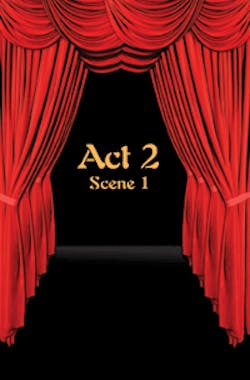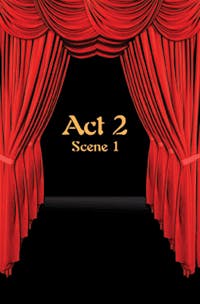Life is a two-act play
by Doug Young, MBA
It was the biggest smile I had ever seen on his face. I was chatting with my dad in his home in Ancaster, Ontario. It was 1972, and he had just told me that his employer had asked him to stay on for one year past the usual retirement age of 65. I had never seen him happier. Dad graduated as a lawyer from the University of Saskatchewan during the Depression years. He was fortunate to get a job with the National Trust Company, and it was the only job he ever had. He loved his work as much as anyone I knew, and to continue for another year was a priceless gift.
My father retired in September 1973. He died of a stroke just over a year later. To this day, I ask myself, “Why did he live for only 14 months after completing a successful career? He never had a major illness in his life.” I can’t know all the answers, but I believe that his life changed dramatically on the day he finished work. The driving passion of his life was over, and he had nothing of meaning to retire to. Regrettably, his story is not unusual, but you can avoid going down the same path! This column is not specifically about retirement. It is really about how we can choose to live “the second half” of our lives.
Competence is your foundation
These two “halves” of life are not likely to be identical in length. But they represent two very different segments of life - in effect, Act 1 and Act 2. I began to more clearly understand this through William Bridges’ work on transitions. (“Unleashing Your Potential,” Dental Economics®, February 2007.) He comments that we spend the first part of our lives motivated by the opportunity to demonstrate our competence. We invest in an education. The necessity to make a living leads us to pursue a vocation and apply what we have learned. All the hard work, studying, mentoring, and learning on the job begin to pay dividends. Our competence grows as we develop our skills, add more educational layers, and take on new tasks and higher levels of responsibility. Competence becomes the foundation for living a productive and successful life. It allows us to move forward.
But will demonstrating this competence continue to be our driving force? Bridges says no! Eventually, competence isn’t enough, and a life-changing transition occurs. Increasingly our motivation comes from the opportunity to find meaning and purpose in what we do. Life becomes less about the how of things, and more about the why. We look for meaningful ways to channel that competence. Act 1 comes to an end, and Act 2 begins. For my dad, however, there was no follow up to Act 1.
Preparing for Act 2
What have I learned from all this? More than anything, I’ve learned that we must intentionally prepare for the second act of our lives. I’ve learned that we must start this preparation earlier in life, rather than procrastinate until it’s too late. I’ve learned from the wisdom of Frederic Hudson, founder of the Fielding and Hudson Institutes. Having been diagnosed in his late 60s with Alzheimer’s disease, he said, “I’m at the end of who I was. But I’m at the beginning of who I might become. That’s exciting to me.” He helped me to understand how important our attitudes are as we approach Act 2, regardless of the circumstances. And I’ve learned from Richard Leider. Last November, I attended his “Working On Purpose” retreat to focus more on living the second half of my life with purpose.
It was a thought-provoking day, and three things immediately stood out. When I opened the workbook, I read, “For every person who summons the energy and courage to live their story, there are many more who hesitate, who are afraid, who plod on - waiting for some special moment, for a push over the risk edge.” “Live their story” was the phrase that I couldn’t dismiss. For me, it means that I am actively using my gifts and talents in a way that honors my purpose.
But here’s the challenging part. It also means that I’m not just blindly continuing to do those things that I have always done. I’ve demonstrated my competence and finished Act 1 of my life. Now it’s time to begin Act 2, and to live my story by doing what’s most important to me now.
Next, I was asked to consider genetics and personal health history, and assign an age for my death. I chose 84, but the specific age was not the most impactful thing. What hit me was that under this premise, I had 17 years left. This naturally led to the question, “How will I choose to spend this time?”
My friend Charlie O’Leary said that I could make two mistakes when thinking about these 17 years: 1) I could conclude that this was a long time, and therefore my search for meaning and purpose could wait, or 2) I could see it as a short time and decide it was really too late to invest time and energy in such a search. I don’t want to make either mistake!
Move forward and grow
Finally, I realized that moving from Act 1 to Act 2 was a huge step in continuing my growth process. To not take this step would mean stagnation, and of course, I thought about my dad and what stagnation brought him. To move forward and grow, I must reinvent myself. What parts of my life do I want to hold on to? What parts should I let go of because they are no longer serving me well? What new skills, attitudes, and behaviors should I take on? How will I move on by doing new things that will carry me closer to meaning and purpose? Should you ask these questions of yourself? It’s never too late!
We can all learn from Harry Bernstein. During his career, he was a script reader for movie production companies and a magazine editor. Although he had penned articles, he had never written a book. In his 90s, he was devastated by the death of his wife of nearly seven decades. Almost as therapy, he decided to write about his life growing up in a northern England mill town. His writing became a manuscript that was turned down by New York publishers. But Kate Elton of Random House in London read it and described it as “unputdownable.” The book, The Invisible Wall, was published in March 2007. At age 96, Harry had written his first book! His second is now almost complete. Harry is living his story!
How about you? Life shouldn’t be lived as a one-act play. Your life story is so much more than that. You have corners yet to turn. Just imagine what’s around them. When the lights go down on Act 1 of your life, what do you want the set to look like when the curtain goes up on Act 2?Doug Young, MBA, and his spouse Marlyn, MCC, have a professional speaking and executive/team coaching business in Parker, Colo. They co-author this column and share an interest in leading-edge business concepts, achieving personal and professional potential, serving patients, and improving how people work together. Marlyn’s insights into people and relationships and coaching skills complement Doug’s motivating and mind-expanding presentations. Contact them at [email protected], by phone at 877-DMYOUNG, or on the Web at www.dmyoung.com.

